Omnitruncated simplectic honeycomb
In geometry an omnitruncated simplectic honeycomb or omnitruncated n-simplex honeycomb is an n-dimensional uniform tessellation, based on the symmetry of the affine Coxeter group. Each is composed of omnitruncated simplex facets. The vertex figure for each is an irregular n-simplex.
The facets of an omnitruncated simplectic honeycomb are called permutahedra and can be positioned in n+1 space with integral coordinates, permutations of the whole numbers (0,1,..,n).
| n | Image | Tessellation | Facets | Vertex figure | Facets per vertex figure | Vertices per vertex figure | |
|---|---|---|---|---|---|---|---|
| 1 | Apeirogon |
Line segment | Line segment | 1 | 2 | ||
| 2 | 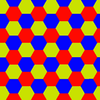 |
Hexagonal tiling |
 hexagon |
Equilateral triangle |
3 hexagons | 3 | |
| 3 | 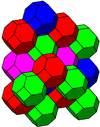 |
Bitruncated cubic honeycomb |
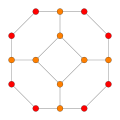 Truncated octahedron |
irr. tetrahedron |
4 truncated octahedron | 4 | |
| 4 | Omnitruncated 4-simplex honeycomb |
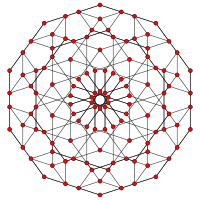 Omnitruncated 4-simplex |
irr. 5-cell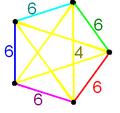 |
5 omnitruncated 4-simplex | 5 | ||
| 5 | Omnitruncated 5-simplex honeycomb |
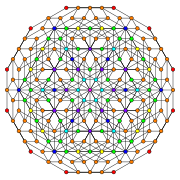 Omnitruncated 5-simplex |
irr. 5-simplex |
6 omnitruncated 5-simplex | 6 | ||
| 6 | Omnitruncated 6-simplex honeycomb |
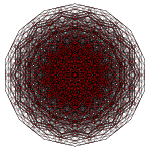 Omnitruncated 6-simplex |
irr. 6-simplex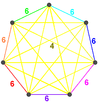 |
7 omnitruncated 6-simplex | 7 | ||
| 7 | Omnitruncated 7-simplex honeycomb |
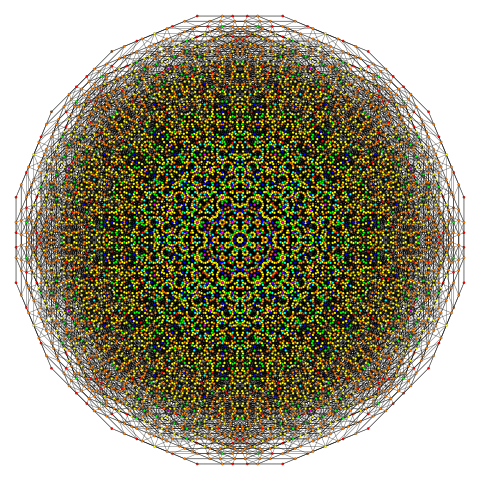 Omnitruncated 7-simplex |
irr. 7-simplex |
8 omnitruncated 7-simplex | 8 | ||
| 8 | Omnitruncated 8-simplex honeycomb |
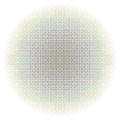 Omnitruncated 8-simplex |
irr. 8-simplex |
9 omnitruncated 8-simplex | 9 |
Projection by folding
The (2n-1)-simplex honeycombs can be projected into the n-dimensional omnitruncated hypercubic honeycomb by a geometric folding operation that maps two pairs of mirrors into each other, sharing the same vertex arrangement:
| ... | ||||||||
| ... |
gollark: I mean, it's bad for your liver and stuff, and also brain.
gollark: alcohol bad.
gollark: Please note that I am not responsible for any damage to chickens and/or other animals and/or mothers caused directly or indirectly as a result or not as a result of messages sent by me or other people on Discord or other platforms.
gollark: I think you can get spares from farms for free, even.
gollark: They're actually quite cheap.
See also
- Hypercubic honeycomb
- Alternated hypercubic honeycomb
- Quarter hypercubic honeycomb
- Simplectic honeycomb
- Truncated simplectic honeycomb
References
- George Olshevsky, Uniform Panoploid Tetracombs, Manuscript (2006) (Complete list of 11 convex uniform tilings, 28 convex uniform honeycombs, and 143 convex uniform tetracombs)
- Branko Grünbaum, Uniform tilings of 3-space. Geombinatorics 4(1994), 49 - 56.
- Norman Johnson Uniform Polytopes, Manuscript (1991)
- Coxeter, H.S.M. Regular Polytopes, (3rd edition, 1973), Dover edition, ISBN 0-486-61480-8
- Kaleidoscopes: Selected Writings of H.S.M. Coxeter, edited by F. Arthur Sherk, Peter McMullen, Anthony C. Thompson, Asia Ivic Weiss, Wiley-Interscience Publication, 1995, ISBN 978-0-471-01003-6
- (Paper 22) H.S.M. Coxeter, Regular and Semi Regular Polytopes I, [Math. Zeit. 46 (1940) 380-407, MR 2,10] (1.9 Uniform space-fillings)
- (Paper 24) H.S.M. Coxeter, Regular and Semi-Regular Polytopes III, [Math. Zeit. 200 (1988) 3-45]
Fundamental convex regular and uniform honeycombs in dimensions 2-9 | ||||||
|---|---|---|---|---|---|---|
| Space | Family | / / | ||||
| E2 | Uniform tiling | {3[3]} | δ3 | hδ3 | qδ3 | Hexagonal |
| E3 | Uniform convex honeycomb | {3[4]} | δ4 | hδ4 | qδ4 | |
| E4 | Uniform 4-honeycomb | {3[5]} | δ5 | hδ5 | qδ5 | 24-cell honeycomb |
| E5 | Uniform 5-honeycomb | {3[6]} | δ6 | hδ6 | qδ6 | |
| E6 | Uniform 6-honeycomb | {3[7]} | δ7 | hδ7 | qδ7 | 222 |
| E7 | Uniform 7-honeycomb | {3[8]} | δ8 | hδ8 | qδ8 | 133 • 331 |
| E8 | Uniform 8-honeycomb | {3[9]} | δ9 | hδ9 | qδ9 | 152 • 251 • 521 |
| E9 | Uniform 9-honeycomb | {3[10]} | δ10 | hδ10 | qδ10 | |
| En-1 | Uniform (n-1)-honeycomb | {3[n]} | δn | hδn | qδn | 1k2 • 2k1 • k21 |
This article is issued from Wikipedia. The text is licensed under Creative Commons - Attribution - Sharealike. Additional terms may apply for the media files.